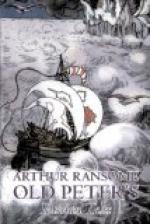Of course the Volga told her not to be so rude, and said that little rivers should know their place and not argue with the great.
But the Vazouza would not keep quiet, and at last she said to the Volga: “Look here, we will lie down and sleep, and we will agree that the one of us who wakes first and comes first to the sea is the wiser of the two.”
And the Volga said, “Very well, if only you will stop talking.”
So the little Vazouza and the big Volga lay and slept, white and still, all through the winter. And when the spring came, the little Vazouza woke first, brisk and laughing and hurrying, and rushed away as hard as she could go towards the sea. When the Volga woke the little Vazouza was already far ahead. But the Volga did not hurry. She woke slowly and shook the ice from herself, and then came roaring after the Vazouza, a huge foaming flood of angry water.
And the little Vazouza listened as she ran, and she heard the Volga coming after her; and when the Volga caught her up—a tremendous foaming river, whirling along trees and blocks of ice—she was frightened, and she said,—
“O Volga, let me be your little sister. I will never argue with you any more. You are wiser than I and stronger than I. Only take me by the hand and bring me with you to the sea.”
And the Volga forgave the little Vazouza, and took her by the hand and brought her safely to the sea. And they have never quarrelled again. But all the same, it is always the little Vazouza that gets up first in the spring, and tugs at the white blankets of ice and snow, and wakes her big sister from her winter sleep.
* * * * *
They drove on over the flat open country, with no hedges, but only ditches to drain off the floods, and very often not even ditches to divide one field from another. And huge crows, with gray hoods and shawls, pecked about in the grass at the roadside or flew heavily in the sunshine. They passed a little girl with a flock of geese, and another little girl lying in the grass holding a long rope which was fastened to the horns of a brown cow. And the little girl lay on her face and slept among the flowers, while the cow walked slowly round her, step by step, chewing the grass and thinking about nothing at all.
And at last they came to the village, where the road was wider; and instead of one pair of ruts there were dozens, and the cart bumped worse than ever. The broad earthy road had no stones in it; and in places where the puddles would have been deeper than the axles of the wheels, it had been mended by laying down fir logs and small branches in the puddles, and putting a few spadefuls of earth on the top of them.
The road ran right through the village. On either side of it were little wooden huts. The ends of the timbers crossed outside at the four corners of the huts. They fitted neatly into each other, and some of them were carved. And there were no slates or tiles on the roofs, but little thin slips of wood overlapping each other. There was not a single stone hut or cottage in the village. Only the church was partly brick, whitewashed, with bright green cupolas up in the air, and thin gold crosses on the tops of the cupolas, shining in the clear sky.




